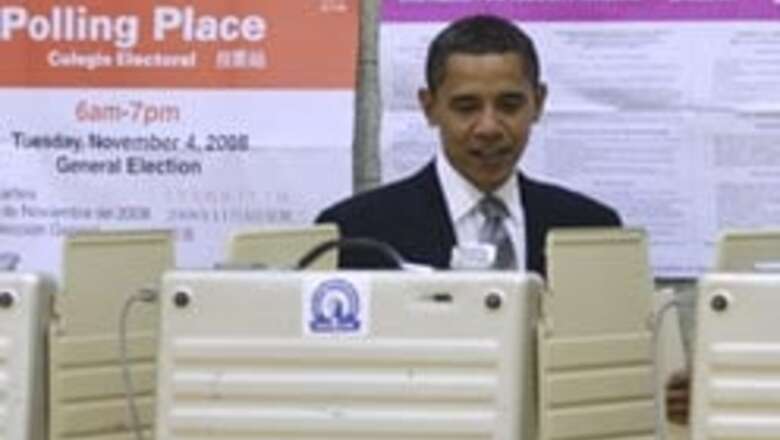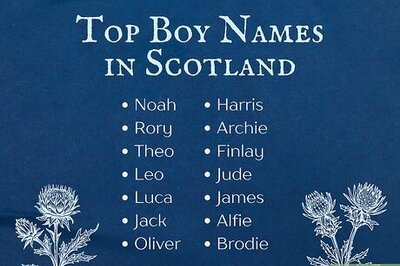
views
Americans go to the polls on Tuesday in what is already being said as one of the most historic elections since the nation began. And it will make more history once the votes are counted.
Senator Barack Obama, the Democratic nominee, could become the nation's first African-American president.
If Republican nominee Senator John McCain wins, he would be the oldest person elected to a first term as president, and his running mate, Alaska Governor Sarah Palin, would be the first woman vice president.
Americans are heading to the polls in record numbers on Tuesday, election officials said.
In Dixville Notch, New Hampshire, 100 percent of registered voters – all 21 of them – cast their ballots just after midnight in the first moments of Tuesday morning. For the first time in 40 years, the town voted Democratic in the presidential election, 15 to 6.
Record numbers have already cast ballots in early voting. As of Monday, more than 24 million voters had voted. Election experts predicted more than a third of the electorate would have voted before the polls opened on Election Day.
The 2008 presidential election has also proved to be the most expensive in history.
Obama repeatedly shattered fundraising records by soliciting donations over the Internet. As of Monday, Obama had raised more than $454 million, compared with the $230 million raised by McCain.
Obama – who decided to forgo federal campaign financing, thus avoiding spending limits – used his financial advantage to outspend his opponent on television advertising by more than 2-to-1.
By the end of October, Obama's campaign had spent more than $292 million on advertising, compared to nearly $132 million spent by McCain, who accepted federal campaign financing.
Obama had enough left in the bank to buy time on several networks on Thursday night for a muscle-flexing, 30-minute prime-time ad.
Tuesday also marks the end of one of the longest presidential campaign seasons – nearly 21 months.
Obama announced his candidacy for the Democratic presidential nomination on the steps of the Old State House in Springfield, Illinois, in February 2007, two years after he entered the US Senate.
At the time, the Democratic field was dominated by Senator Hillary Clinton of New York, whom many pundits were calling the "inevitable" candidate.
PAGE_BREAK
But that inevitability was derailed a year later when Obama upset Clinton in the Iowa caucuses in January, winning 38 per cent of the vote.
McCain also defied the odds to won his party's nomination. The self-proclaimed "maverick" announced his candidacy in March 2007 on The Late Show With David Letterman.
He quickly outspent his fundraising, however, and had to fire most of his staff a few months later, his campaign in disarray and nearly broke.
But New Hampshire voters jump-started McCain's campaign with a victory in the state's primary in January 2008, propelling him to the front of the Republican field.
McCain wrapped up the GOP nomination in March after winning a string of primaries over former New York Mayor Rudy Giuliani, who once bore the "inevitable" mantle in the Republican field, and former Massachusetts Governor Mitt Romney, a favorite of the party's conservatives.
Heading into the party conventions, Obama picked Senator Joe Biden, who had also sought the Democratic nomination, as his running mate. Biden's long tenure in the Senate and service on the body's Foreign Relations Committee were seen as shoring up a deficiency in Obama's resume.
McCain, meanwhile, surprised most observers by selecting Alaska's first-term Governor Sarah Palin, a darling of conservatives who had been standoffish in their support of the Arizona senator.
PAGE_BREAK
As McCain and Obama emerged from their parties' conventions, the race was essentially a tossup, with McCain campaigning on his experience and Obama on the promise of change. But the race was altered by the financial crisis that hit Wall Street in September.
Obama began to pull away in the polls nationally as well as in key battleground states. A CNN poll of polls calculated on Monday showed Obama leading McCain 51 percent to 44 percent with 5 percent undecided.
Obama also opened a lead in the race for electoral votes. As of Monday, CNN estimated Obama would win 291 electoral votes and McCain would win 157, with 90 electoral votes up for grabs.
While Palin energised McCain's campaign during the GOP convention, her favorable rating among likely voters fell steadily as Election Day neared. Her pit-bull-with-lipstick persona, as she described it, didn't endear her to independent voters, considered key to winning the election by most observers.
On the last day of campaigning, McCain tried to turn the electoral math to his favor by engaging in a multistate blitz through the battleground states of Florida, Pennsylvania, Indiana, New Mexico and Nevada. He needs those states to get the 270 electoral votes for victory.
McCain will travel on Tuesday to New Mexico and Colorado after he votes in his home state of Arizona, his campaign said on Monday. He will then return to Arizona to watch the election results.
In a sign that he was still on the offensive, Obama spent his last day campaigning in states that have gone for the Republican candidate in recent elections – Florida, North Carolina and Virginia.
On election day, Obama planned to play basketball in Indiana and then make a campaign stop in Indianapolis before heading home to Chicago, Illinois, to watch the election results.
Obama has played basketball on all the days of his Democratic primary victories.



















Comments
0 comment